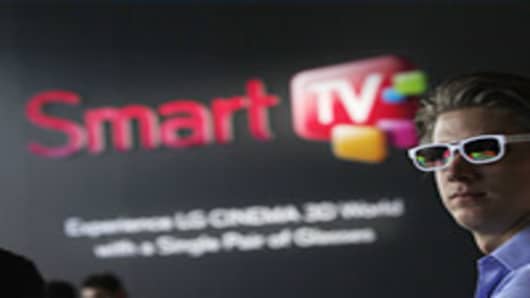Pretty much every year, a big trend emerges from the Consumer Electronics Show. And pretty much every year, it's heralded — at least for a short while — as the next big thing in consumer electronics.
This year, it's shaping up to be Ultrabooks. The problem is: In many ways, the "next big thing" of the last few years hasn't really been all that big.
The buzz at CES was 3D TV two years ago, but that's still struggling to find an audience. Tablet computers were deemed the "it" last year, but beyond Amazon's Kindle and Barnes & Noble's Nook (which were both out long before CES), eReaders quickly died out. And Apple's iPad (which wasn't a part of CES) has greatly overshadowed most of its competition.
Will Ultrabooks underwhelm this year? It's too early to say, but some analysts think it's going to be a while before we see a new technology or advancement that lives up to the hype.
"I'm not sure if I expect to see a wholly new product emerge this year," says Ben Arnold, director of industry analysis for consumer tech at NPD. "Reading the tea leaves, I feel like a lot of the focus will be on improving the stuff that's already out there."
Some analysts, in fact, question whether there will even be a next big thing — ever. The move to a more multifunctional mobile world is consolidating electronics — and that erects more hurdles for technologies hoping to open up new spaces.
"What I really think is the biggest trend in consumer electronics kind of argues that there won't be a next big thing," says Jordan Selburn, principal analyst for consumer platforms for IHS iSuppli. "What's taking over the consumer market is the end of the single tasker — the end of the device that does just one thing. … We're entering an area where software is the thing. You've got three or four general purpose platforms that can do anything, and they do."
If Selburn and Arnold are right, the evolution of existing electronics will be critical — and will drive replacement cycles forward. The television industry continues to push 3D hard, but until there's a critical mass of programming that can be watched without glasses, there's not likely to be much consumer interest.
While 3D technology is certain to be a feature of most sets, the concept of the Internet-enabled TV actually holds more promise. The "connected home" has been a buzzword for years now — a premise in which appliances talk with each other and homeowners can easily do things like program their thermostat from remote locations.
The reality, though, has been expensive and hard to install. Advances in control techniques could be a breakthrough, however.
Apple's Siri and Microsoft's Kinect peripheral for the Xbox 360 are opening up new avenues to search for content and control devices, and could be installed in more electronics.
"I can definitely see that working its way into more products, and I think it's in the works," says Arnold. "I would expect to see some of that at this CES and definitely at the 2013 CES. … There are plenty of stories about people hacking Kinect to use with web browsers and such. That's where the energy starts for these sorts of things."
Much of the talk about this year's show has centered around ultrathin laptops. Dubbed "Ultrabooks" by Intel (which is leading the charge for the systems), they measure only 3mm at their narrowest points.
Shawn DuBravac, director of research for the Consumer Electronics Associations, predicts that 30 to 50 Ultrabooks will debut at this year's show — an impressive number for any market. Intel and PC makers hope the systems will offer a competitive alternative to Apple's MacBook Air —and regain some marketshare from the tablet space.
Analysts aren't convinced the laptops will succeed in that last objective.
"The vast majority of stuff that people do with their computers today is content consumption, not creation," says Selburn. "And for content consumption, the advantages a tablet has — in terms of usability and cost — probably keep it the superior option."
As for tablets, they will continue to evolve, say analysts — perhaps finally stepping out of the shadow of Apple. In fact, it appears that Amazon has led the way on that front, creating a device that doesn't try to replicate the iPad, but offers a different set of features for a different audience.
"What needs to happen is these products need to find a niche or differentiate themselves," says Arnold. "It's hard to put out a product that's kind of like the Apple ecosystem, but lacks the apps and costs the same amount."
Apps seem to be driving the most innovation these days — so much so that this year's CES has vastly expanded the amount of floor space dedicated to them. Once confined to a 4,000-foot section, the iLounge Pavilion now covers 75,000 square feet. The area was originally set to be 50,000 square feet this year, but was expanded because of demand.
"You've got a computer in your pocket, you've got a computer in your briefcase, you've got a computer on your desk — and pretty soon you're going to have a computer in your TV — all running apps — and they're going to do most of what you want to do," says Selburn. "The problem is: How do you wrap up an app and put it under the tree at Christmas?"


